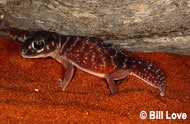Description:
A secretive species, this nervous lizard is best set up in a terrarium decorated to resemble its desert domain so it can be watched and enjoyed like a tropical fish. The knob-tailed gecko is not recommended for those who wish to handle their lizards often, like would be acceptable with a leopard gecko. The smooth knob-tailed gecko occurs in arid, sandy stretches of desert and grasslands where the only humid alcove for much of the year is the bottom of their burrow. Give smooth knob-tailed geckos a cage with at least 4 inches of sandy soil so they can construct a tunnel in which to repose during the day. Add water to the burrow end of the cage so the soil clings enough that burrows don’t collapse. These adept little predators emerge at sunset to stalk insects. Smooth knob-tailed geckos often comically wave their stubby tails when they get excited by prey in sight, but also do it when disturbed and stressed by human presence. Feed them at dusk after they’ve had a chance to rest their bellies on the hot ground where a heat lamp has recently shone. For more information, read our detailed smooth knob-tailed gecko care sheet. .
Habitat:
Deserts
Range:
Western Australia
Scientific Name: Nephrurus levis
Species Group: gecko
Family: Gekkonidae
Size: 3 to 4½ inches
Level: intermediate
Weight:
Dangerous: No



